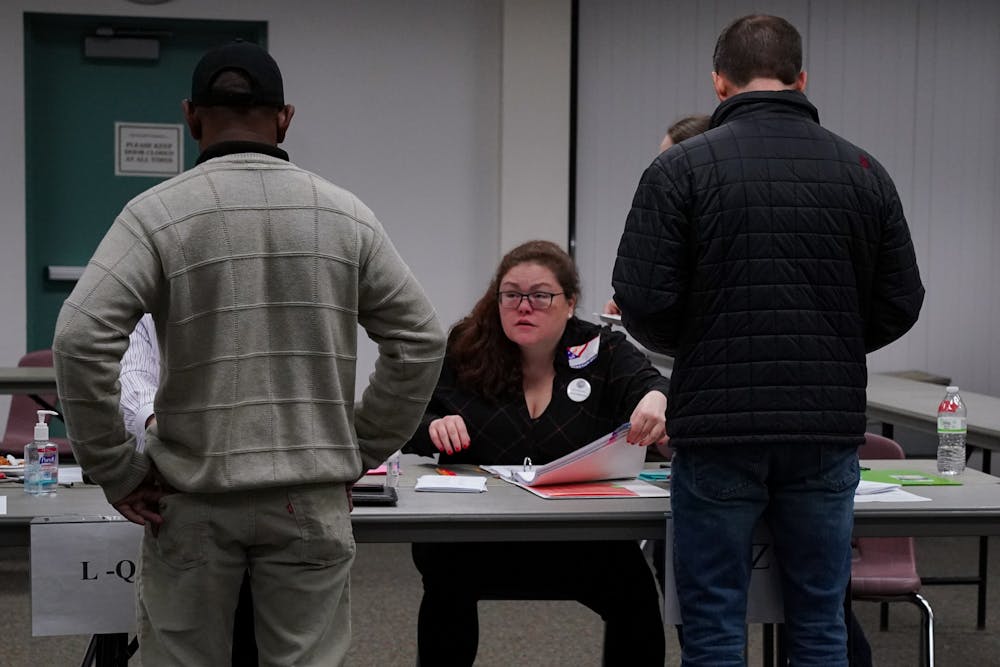
People standing in line at the New Hampshire Primary Election polling site in mid-February.
Credit: Chase SuttonIn an unprecedented election year, with critical contests up and down the ballot, preserving our democracy’s integrity is more important than ever. With the COVID-19 pandemic, however, municipalities across the country are facing a poll worker shortage. Many regular poll workers, who tend to be older than the population at large – a majority being over the age of 60 – are choosing to sit this election out due to their added risk for complications from COVID-19.
Having sufficient poll workers is essential to the smooth running of elections, and young folks are generally at less risk for complications and death than the typical poll worker. It is necessary that those who can risk exposure and are eligible for poll work do their civic duty and help our election be safe and fair. In light of the aforementioned shortage, Penn students who do not have added risk factors should step up and volunteer to be poll workers.
Poll workers play an important part in how our elections function by helping keep poll lines moving and wait times short, ensuring that all eligible voters can exercise their right to vote. Besides being an annoyance, long wait times actively disenfranchise voters, particularly in Black and Latinx communities, by discouraging voting and disallowing it for those who do not have the time to wait in line. This November, these long lines will additionally pose a health risk. Having adequate numbers of poll workers will allow cities like Philadelphia to keep a maximum number of polling locations open, making voting safer, faster, and more convenient for everyone.
Despite more individuals opting to vote by mail-in or absentee ballot than ever before, many voters still rely on in-person voting. With concerns around ballots getting lost in the mail or not arriving in time, polling places are just as important as ever. Research also shows that many Black and Latinx voters prefer in-person voting over mail-in options. Not having adequate staffing at polls or having reduced polling locations will disproportionately affect these voters.
Many Penn students are in an ideal age range to volunteer to poll work this year. The Centers for Disease Control and Prevention reports lower rates of death and complications from COVID-19 in individuals ages 15-24 than in older age groups. Since many jurisdictions (including Philadelphia in most cases) also require poll workers to be 18, most college students are both old enough to volunteer and young enough where risk of complication is lower than for other adults.
Although Penn will not excuse student poll workers from class on Nov. 3, students should still channel the Year of Civic Engagement and put their actions where Penn’s words are. Many professors are likely to be supportive of students electing to be poll workers, and might allow excused absences when approached individually.
With a president who has refused to commit to a peaceful transfer of power, and repeatedly undermines the election process, protecting our elections and voter enfranchisement must be a top priority for us all. Penn students can do their part by volunteering to be a poll worker, in Philadelphia or wherever they might be this semester.
To become a poll worker in Philadelphia, you may confirm your eligibility and apply here. For other municipalities, check out your state’s eligibility requirements and reach out to your local election official.
Editorials represent the majority view of members of The Daily Pennsylvanian, Inc. Editorial Board, which meets regularly to discuss issues relevant to Penn's campus. Participants in these meetings are not involved in the reporting of articles on related topics.
The Daily Pennsylvanian is an independent, student-run newspaper. Please consider making a donation to support the coverage that shapes the University. Your generosity ensures a future of strong journalism at Penn.
Donate



